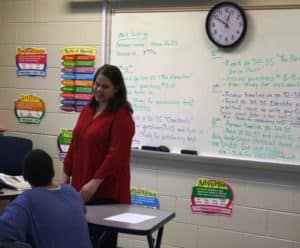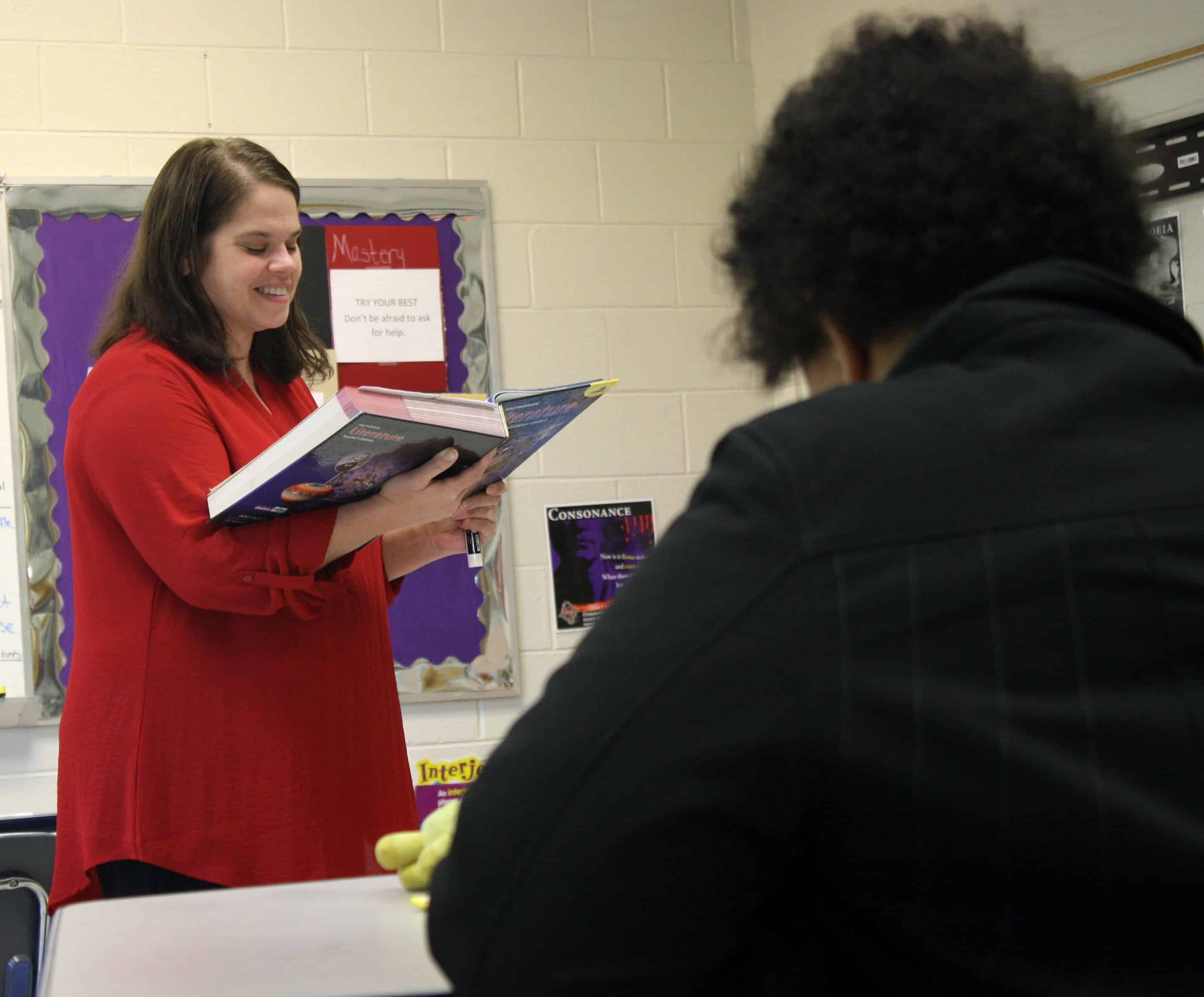Kim Denmark has been teaching for 12 years. She spent six years in public schools before transitioning to Charterhouse School. Read below for a firsthand account of her journey.
Do you know what used to strike fear in the heart of this teacher when I entered the classroom twelve years ago? Two things: differentiated instruction and disruptive student behavior. As it turns out, these two things would help me find myself as a teacher. In the beginning, I knew I could come close, but I doubted I would ever really master these two intimidating components of education. Don’t get me wrong, I started off strong. When I first started teaching in public school—I was a substitute teacher for three years first—principals used to stop me in the hall, impressed that such a novice could inspire her students to walk in a straight and orderly line down the hall, and I still remember the time my mentor struggled to believe that a first year teacher was actually differentiating instruction for student interest. I’m not bragging. I am simply sharing how naïve I was to think that maintaining this level of instruction and classroom management was all it would take to find success and meaning as a teacher. This was just the beginning.
I was about three years into my teaching career and I was already finding it to be less than what I had hoped. I had decided to become a teacher because I hoped to inspire a love of learning and self confidence in my students. I was coming up short. I seemed to spend all of my time just trying to master writing lesson plans, learning how to efficiently grade student essays, and juggle a million meetings. I managed to get to know a few of my students but I also still cringe at the memory of getting to the end of the year and realizing that I had students sitting in my class with whom I hadn’t had one meaningful conversation all year.
By year six, I was doing better, but I was burning out fast. Too much busy work and not enough quality interactions with students. You know, it’s funny. Most K-12 educators understand that the most important thing a student can have in her educational experience is the knowledge that there is at least one adult at school who cares for and takes an interest in her. We seem to inherently get that relationship is the key to student success. Why don’t we get that when it comes to teachers? Having relationships with students helps us flourish too. Don’t get me wrong, I can still get pretty jazzed up about a grammar lesson and I love a rowdy discussion about a theme from a short story or novel, but my main love is young people. It’s why I haven’t quit teaching and found something else. It’s how most of my teacher friends feel too. We like the variety of people under the age of 18, or thereabouts. They keep us young. They make us laugh. For days sometimes.

What could I do? I had to figure it out. Perhaps a smaller setting would help, I thought. A friend of mine suggested that I apply for a teaching job at Charterhouse School. A specialized education school? I had heard of these schools in Individualized Educational Program (IEP) meetings, and they were for the really bad cases, right? The students that, despite our best efforts, we just couldn’t get to conform. Oh no, I thought, I wasn’t tough enough for that. I could never do it. Now, in the spirit of full disclosure, I should tell you that I have been known to have this problem where I don’t like to imagine that there are things I can’t do. Probably a childhood carryover from too much running around the back yard pretending to be Wonder Woman. Reason and experience have tempered this some over the years, but back then, I still wondered if I would regret not exploring this scary, crazy idea. Could a public school English teacher make it in the world of specialized education?
I think the easiest way to share my journey with you is to answer some of the questions that I most frequently get when asked about where I work. I had some of these same questions before I chose to teach here. In hindsight, I don’t think I could have made a better decision, but the questions are still valid.
You teach some pretty bad kids, don’t you?
Well, no. The students I teach at Charterhouse are actually really great. I’m not just saying that. Yes, they have some behavioral challenges, but we handle it, and most of the time, they are able to return to class and continue learning. That is one of my favorite things about working at Charterhouse. When a student is having a rough day behaviorally, our support coaches step in and help them figure out what is really going on so that they can resolve the issue and the student can get back to learning. In public school, we didn’t have that additional staff, so I often felt like we were just putting a Band-Aid on the problem until the student went home. It wasn’t for lack of effort. I worked with some amazing and very caring teachers and staff in public school. We just didn’t have enough staff to meet all of our students’ needs. Here, because my classes are smaller, I can normally recognize triggers and address issues as they arise in the classroom before they turn into big blowups. Like I mentioned before, our students are pretty great and they are normally more than happy to talk to an adult about what is bothering them. I’m not saying every situation ends perfectly, but students know they have a lot of support here.
How do you teach all of those different grade levels?
This question normally comes after someone has asked me what grade I teach and I have responded with 6th-12th. I’ll admit, this is a tough one. It is not impossible, though. I work with great teachers who are willing to share and collaborate. Our classes are mixed ability or mixed grade level classes. Slightly younger students have the benefit of older students who can often serve as role models. Even though it is hard, I still choose to teach here. It is because I can get to know my students and target instruction. I am able to remediate here if necessary. My hope is that while it may not be perfect, I am able to meet students where they are academically and move them forward.
How many students do you teach?
Usually no more than 40 total, and my classes run around 6-10 students each. That’s a lot less than the thirty or more I used to teach in one public school class. Now, don’t misunderstand me, I still feel like I have been teaching all day. I still get tired. I still feel like there just isn’t enough time to get everything done. I’m still a teacher. Here is the difference. When a class leaves, I know who got it and who didn’t. In public school, I had a pretty good idea, but a lot of it was guess work. Smaller classes make monitoring each student’s learning much easier.
What do you mean you don’t get summers off?
Okay, I saved this one for last because it is hard to talk about as a teacher and I had to work my way up to it. This is not true for all of our teachers and support coaches at Charterhouse, but for some of us, it is. I know I have totally lost some of you, but try to hang in there a few more sentences with me. Here’s the thing: When I taught in public school, I always taught summer school anyway. I didn’t really get 2 or 3 full months off. Plus, I do get paid to work the additional months in the summer. Some of our students are part of our Child & Family Healing Center and they live on campus. They attend school all year. We try to have fun in the summer (more than the usual amount). We focus on project based-learning, and we take more field trips. The students in our Day and Neurological and Developmental Differences programs can participate in an extended school year program that runs during the summer months too.
I remember going to college and feeling out of sorts for a while until I found my niche. That is what I think Charterhouse School has been for me. It took me some time to find it, but I feel like I have found my professional niche. I really enjoy the students I teach. I feel lucky to have found a school that is trauma informed and seeks to figure out what each child needs to find success instead of trying to make them look like everyone else. It is a most fulfilling job, challenging my professional and personal values, and if I forgot to say this, most days, and I mean 98% of them, it’s fun!
If you are interested in working at Charterhouse School as well, click here to see our current job openings.
